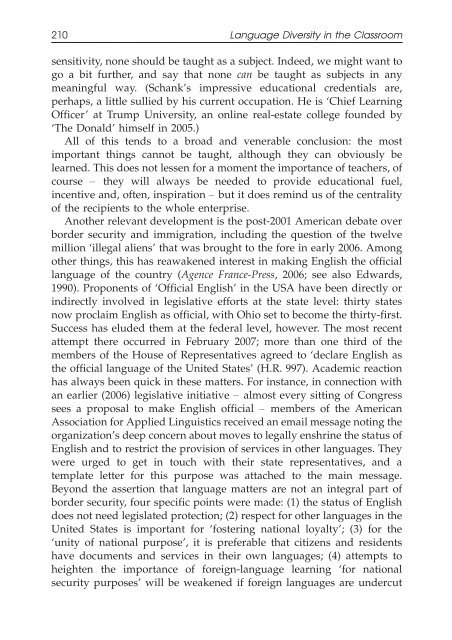Language Diversity in the Classroom - ymerleksi - home
Language Diversity in the Classroom - ymerleksi - home
Language Diversity in the Classroom - ymerleksi - home
- No tags were found...
You also want an ePaper? Increase the reach of your titles
YUMPU automatically turns print PDFs into web optimized ePapers that Google loves.
210 <strong>Language</strong> <strong>Diversity</strong> <strong>in</strong> <strong>the</strong> <strong>Classroom</strong>sensitivity, none should be taught as a subject. Indeed, we might want togo a bit fur<strong>the</strong>r, and say that none can be taught as subjects <strong>in</strong> anymean<strong>in</strong>gful way. (Schank’s impressive educational credentials are,perhaps, a little sullied by his current occupation. He is ‘Chief Learn<strong>in</strong>gOfficer’ at Trump University, an onl<strong>in</strong>e real-estate college founded by‘The Donald’ himself <strong>in</strong> 2005.)All of this tends to a broad and venerable conclusion: <strong>the</strong> mostimportant th<strong>in</strong>gs cannot be taught, although <strong>the</strong>y can obviously belearned. This does not lessen for a moment <strong>the</strong> importance of teachers, ofcourse <strong>the</strong>y will always be needed to provide educational fuel,<strong>in</strong>centive and, often, <strong>in</strong>spiration but it does rem<strong>in</strong>d us of <strong>the</strong> centralityof <strong>the</strong> recipients to <strong>the</strong> whole enterprise.Ano<strong>the</strong>r relevant development is <strong>the</strong> post-2001 American debate overborder security and immigration, <strong>in</strong>clud<strong>in</strong>g <strong>the</strong> question of <strong>the</strong> twelvemillion ‘illegal aliens’ that was brought to <strong>the</strong> fore <strong>in</strong> early 2006. Amongo<strong>the</strong>r th<strong>in</strong>gs, this has reawakened <strong>in</strong>terest <strong>in</strong> mak<strong>in</strong>g English <strong>the</strong> officiallanguage of <strong>the</strong> country (Agence France-Press, 2006; see also Edwards,1990). Proponents of ‘Official English’ <strong>in</strong> <strong>the</strong> USA have been directly or<strong>in</strong>directly <strong>in</strong>volved <strong>in</strong> legislative efforts at <strong>the</strong> state level: thirty statesnow proclaim English as official, with Ohio set to become <strong>the</strong> thirty-first.Success has eluded <strong>the</strong>m at <strong>the</strong> federal level, however. The most recentattempt <strong>the</strong>re occurred <strong>in</strong> February 2007; more than one third of <strong>the</strong>members of <strong>the</strong> House of Representatives agreed to ‘declare English as<strong>the</strong> official language of <strong>the</strong> United States’ (H.R. 997). Academic reactionhas always been quick <strong>in</strong> <strong>the</strong>se matters. For <strong>in</strong>stance, <strong>in</strong> connection withan earlier (2006) legislative <strong>in</strong>itiative almost every sitt<strong>in</strong>g of Congresssees a proposal to make English official members of <strong>the</strong> AmericanAssociation for Applied L<strong>in</strong>guistics received an email message not<strong>in</strong>g <strong>the</strong>organization’s deep concern about moves to legally enshr<strong>in</strong>e <strong>the</strong> status ofEnglish and to restrict <strong>the</strong> provision of services <strong>in</strong> o<strong>the</strong>r languages. Theywere urged to get <strong>in</strong> touch with <strong>the</strong>ir state representatives, and atemplate letter for this purpose was attached to <strong>the</strong> ma<strong>in</strong> message.Beyond <strong>the</strong> assertion that language matters are not an <strong>in</strong>tegral part ofborder security, four specific po<strong>in</strong>ts were made: (1) <strong>the</strong> status of Englishdoes not need legislated protection; (2) respect for o<strong>the</strong>r languages <strong>in</strong> <strong>the</strong>United States is important for ‘foster<strong>in</strong>g national loyalty’; (3) for <strong>the</strong>‘unity of national purpose’, it is preferable that citizens and residentshave documents and services <strong>in</strong> <strong>the</strong>ir own languages; (4) attempts toheighten <strong>the</strong> importance of foreign-language learn<strong>in</strong>g ‘for nationalsecurity purposes’ will be weakened if foreign languages are undercut
















